Doctors and nurses will go on strike for two days this week. They demand better working conditions, higher salaries, and increased investment in the National Health Service (NHS). The protest is being organized by the National Federation of Doctors and the Portuguese Nurses Union.
Read More About: National Health Service Reforms Urged by Portuguese Doctors’ Association
The strike is scheduled for Tuesday and Wednesday in front of the Ministry of Health in Lisbon. It will begin with a demonstration by doctors on the first day, followed by a gathering of nurses on the second day.
Reasons Behind the Strike

The presidents of the Portuguese Nurses’ Union (SEP), José Carlos Martins, and the National Federation of Doctors (FNAM), Joana Bordalo e Sá, explained to the media the reasons behind the scheduled protest.
They clarified that the strikes happening on the same days were a coincidence. However, they did not rule out the possibility of a future joint protest involving all health unions. Joana Bordalo e Sá told the media:
We are completely independent structures (…) but the fact that both classes have coincidentally called the strike at the same time only demonstrates the discontent that exists in this area and how there has been no competence on the part of this Ministry of Health, of Ana Paula Martins, in resolving the situation.
Collective Action for Change

Furthermore, José Carlos Martins emphasized that there was no coordination with FNAM when calling the strike, which SEP had announced on August 9. However, he highlighted the need and importance of all health unions coming together to decide on forms of struggle.
This collective action aims to demand increased investment in the NHS and recognition for all health professionals.
Joana Bordalo e Sá echoed this sentiment, adding that FNAM has discussed the possibility of uniting all health professionals, including doctors, nurses, pharmacists, senior health technicians, and psychologists.
Furthermore, she suggested that a collective protest involving all these groups could be on the table for future actions. The doctor highlighted that:
This is possible and will depend, above all, on what this Ministry of Health, led by Ana Paula Martins, does. Who knows if we won’t have to escalate, intensify the fight even more, and the appeal that remains is for the entire health sector to unite.
Concerns About NHS Shutdown
When asked whether the doctors’ and nurses’ strike might result in a larger shutdown of the NHS, José Carlos Martins, the president of the SEP, responded that he could not provide a clear answer but anticipated good support from health professionals for the strike.
Moreover, as for the profession’s demands, José Carlos Martins emphasized the need for fair appreciation of the remunerative positions across all categories of the nursing career.
In addition to the salary scale, the SEP also seeks to negotiate mechanisms to compensate for the risk and hardship inherent to the profession, through early retirement.
They also aim to address the injustices regarding the counting of points and career progressions and push for the hiring of more professionals.

Response from FNAM
The president of FNAM stated, in turn, that the doctors were pushed to strike due to a lack of response from the authorities. He explained:
We do not have any serious negotiations underway, only façade negotiations have been initiated. And specifically regarding doctors, there is nothing that can currently be resolved and attract more doctors to the NHS, which is why the FNAM has also declared this strike.
The union leader stressed that it is not just about demanding fair wages and decent working conditions. He added:
It is also a question of defending the NHS, which must be public, universal and of quality to serve the entire population, whether at the level of primary health care, hospitals or public health. We understand that this is an emergency.
Urgent Salary Scale Discussion
Joana Bordalo e Sá stated that it would be extremely important for the salary scale to be discussed and decided by the end of September so that it can be included in the 2025 State Budget. However, she expressed regret that there has been no such sensitivity on the part of this Minister of Health.
She emphasized the need to restore doctors’ purchasing power, noting that they remain among the lowest-paid doctors in Europe. Therefore, many continue to leave for the private sector and seek opportunities abroad, contributing to the chaos currently affecting the NHS.

Key Priorities of FNAM
For FNAM, key priorities include:
- Returning to a 35-hour workweek
- Implementing 12-hour shifts in emergency services
- Reintegration of internships into the medical career
- Establishing an optional exclusive dedication regime for all doctors, with appropriate compensation
Joana Bordalo e Sá concluded by saying:
We never tire of saying that we demand a minister who understands health and we hope that on the 24th, in front of the Ministry of Health, we will have doctors, but also other health professionals, users, the population in general, to defend, above all, the NHS.






